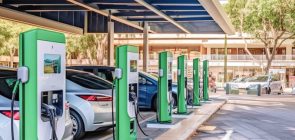
Legislation
Legislation
We track and contribute to important legislation at the national and European level. We develop proposals to promote a healthy and fair business environment in the electric mobility sector. We prepare position papers on priority topics and submit legislative proposals to ministries and state authorities.
News on legislation
European legislation and policies are based on the EU Green Deal, which is the European Union’s response to the growing challenges posed by climate crisis.
This agreement aims to reduce greenhouse gas emissions by at least 55% by 2030 (in compared to 1990 levels) and achieve climate neutrality by 2050.
These strategic objectives should be achieved by implementing a comprehensive package of legislative- Fit for 55.
A number of regulations and directives in the area of e-mobility are covered by the Fit for 55 package on vehicle emissions, charging infrastructure, batteries and industrial policy.
The approved EU Regulation on CO2 emission standards for new passenger cars and light commercial vehicles (vans) sets a trajectory for a 100% reduction in emissions by 2035. In practical terms, this means that from 2035 it will be economically viable to market cars and vans with zero CO2 emissions. The registration of a vehicle with emissions higher than 0 g CO2/km will not be directly prohibited, but its manufacturer will have to pay a fee to the European budget according to a set formula. The regulation respects the principle of technological neutrality and leaves it up to car manufacturers to decide which technology (powertrain) will achieve the zero-emission target.
In the first half of 2023, the European Commission proposed an amendment to tighten the targets in the already approved EU Regulation on CO2 emission standards for new heavy-duty vehicles. This proposal covers trucks (over 5 t) and buses (over 7.5 t) and, among other things, sets a CO2 reduction target for trucks of 45% by 2030 and 65% by 2035. Newly registered urban buses should only be zero-emission from 2030 onwards.
The approved EU Alternative Fuels Infrastructure Regulation (AFIR) sets binding targets for the development of charging infrastructure in Member States (so-called capacity targets as well as based on the distance between charging points). It also defines a number of details regarding the operation of charging stations. These include minimum service standards in terms of authentication and payment or charging price display.
The revision of the Energy Performance of Buildings Directive (EPBD) is currently in the legislative process. This law would affect the objectives and conditions for installing charging stations in residential and office buildings. This amendment proposes, among other things, to tighten the targets for the pre-installation of chargers (pre-cabling) as well as to increase the mandatory minimum number of charging stations in newly constructed or renovated collective garages.

Batteries and industrial policy
The approved EU Battery Regulation comprehensively defines a number of details on battery production and, among other things, the conditions for recycling batteries at the end of their life cycle. To illustrate, the set recycling rate for the whole battery is set at 70% (from 2030) and at 95% for active materials (cobalt, copper, nickel) and 80% (lithium) respectively.
The Net Zero Industry Act (NZIT) is also in the legislative process and is aimed at removing barriers and promoting the expansion of production capacity in selected sectors (including the battery industry and energy technologies).
Another relevant piece of legislation currently in process is the Critical Raw Materials Act.

Helpful links
EU Regulation on CO2 emission performance standards for new passenger cars and light commercial vehicles (vans)EU regulation on CO2 emission standards for new heavy goods vehiclesEU Alternative Fuels Infrastructure Regulation (AFIR)EU Energy Performance of Buildings Directive (EPBD)EU battery regulationNet Zero Industry ActCritical Raw Materials Regulation
Slovak legislation
Slovakia, as an EU member state, is committed to fully implement the adopted commitments and rules of European legislation and policies. This concerns both, the adopted EU Green Deal, as well as the legal legislative acts resulting from the Fit for 55 package.
The direct effect of the rules (without the need to amend Slovak laws) applies to all adopted EU regulations which apply as published in the Official Journal of the EU (see documents above). This applies to regulations aimed at reducing vehicle emissions, charging infrastructure (AFIR) as well as on batteries and industrial policy.
Transposition into Slovak legislation requires an amendment to the European Directive on Energy Performance of Buildings Directive (EPBD), the text of which will be finalised after its adoption will need to be transposed into the Slovak Energy Performance of Buildings Act.
The primary regulation of e-mobility business is defined by the Energy Act, which defines the basic concepts as well as the conditions for charging services. Operation of a charging station and the provision of charging is not perceived as an energy business, which implies that the provider of this service does not have to fulfil the obligations related to the sale of electricity. In this Act also defines terms such as charging station or charging point and obligations towards the Office for the Regulation of Network Industries, including the reporting obligation of the operator public charging point.
Under the Energy Act, when connecting a charging station with a total installed capacity exceeding 100 kW, it is necessary to submit an application for connection to the distribution system and conclude a connection contract with the distribution system operator.
The Building Act lays down conditions for the authorisation and construction of charging stations and the specific procedure depends on the type of station, its location and other details (e.g. availability of parking space). However, as of 1 April 2024, the new Building Act, which will change the permitting process for charging stations in many ways. Among other things, the under this law, the competence of the construction procedure is transferred to the state, which will introduce a single decision on the construction plan, which will also be the verification of the construction project. Charging stations with a total combined capacity in the building of up to and including 25 kW fall under the category of simple buildings.
The current version of the Energy Performance of Buildings Act provides for a number of obligations for the construction of residential and non-residential buildings related to charging electric vehicles. The law defines minimum numbers of charging points for different sizes of parking spaces or number of parking spaces. It also establishes the minimum range of of pre-prepared electrical wiring for the installation of chargers.
A number of measures aimed at the development of electromobility are included in the government’s Electromobility Action Plan. Among other things, this document envisages the introduction of subsidies for the purchase of electric vehicles, several tax advantages for purchasing and charging of electric vehicles aimed at companies or user benefits for green registration plates. Support for the construction of charging infrastructure has also been included among the measures of various kinds.
Financial support of EUR 46 million for different types of charging points is approved in the Recovery and Resilience Plan. More than €10 million is directed to support cities, more more than €6 million for legal entities, and more than €30 million should be spent on building hubs with ultra-fast charging points at motorway rest areas. Implementation and organisation of calls for this support is provided by the Ministry of Economy in coordination with other in coordination with other actors (e.g. the National Motorway Company).

Helpful links
Law on EnergyBuilding Act (new)Energy Performance of Buildings Act Electromobility Action PlanRecovery and Resilience Plan
SEVA Business Hubs
SEVA Business Hubs are designed to target the most important topics in the area of e-mobility. The aim is to provide a space for companies and individuals to collaborate in a focused, topic-oriented "business hub".
-
SEVA Business Hub

Automotive Industry Transformation
An initiative aimed at the effective transition of the Slovak automotive segment to e-mobility.
-
SEVA Business Hub

Electric & Digital Transformation
The expansion of the energy system is a necessary step in the transition from fossil fuels to electricity.
-
SEVA Business Hub

Corporate eFleet
Here you can find practical information on how to switch your company fleet to EVs.
-
SEVA Business Hub

Electric Heavy Duty Vehicles
Public transport, vans, trucks and lorries. All can run efficiently on battery power.
Together, we want to inform the public administration, the professional public and the media about these topics in even greater detail. We want to organize networking and events, promote mutual information sharing, and build an ecosystem around these topics.
Do you want to partner with one of our hubs or do you have a topic that would be attractive enough to start a new hub? Contact us!.
About SEVA
SEVA represents the majority of private companies in the e-mobility sector in Slovakia.
Together, we work towards a healthy and fair business environment. We submit legislative proposals to ministries and state authorities. We educate the professional and general public. We support domestic innovation and engage in development projects. Read more
Learn more

